How to find a project
Past ES196 students tell, in their own words, how they found their current project.
I found my project while interning with the East Bay Regional Park district. This was my first internship, but I think that they would be extremely useful for helping students find projects because they expose them to a great deal of information/work flows/experiences to which the student is not accostomed. So, every year someone in the ES major should apply for the EBRPD internships! There are 4 or 5 of them!
Scott Wise, October 2003
 I knew that I was interested in public health but failed to find any feasible project on my own; I was frustrated by my limited resources and capabilities along with the broad scope of my interests. When Justin Remais come to speak early in 196A about his project with the School of Public Health, it appealed not only to my interests in infectious disease but also international health, and I was fortunate enough to start working with him. In hindsight, I really should have talked to instructors in my health-related classes back during ES 100 as a starting point. I think that public health can be a difficult area for undergrads to work in without the benefit of larger studies or other major resources.
I knew that I was interested in public health but failed to find any feasible project on my own; I was frustrated by my limited resources and capabilities along with the broad scope of my interests. When Justin Remais come to speak early in 196A about his project with the School of Public Health, it appealed not only to my interests in infectious disease but also international health, and I was fortunate enough to start working with him. In hindsight, I really should have talked to instructors in my health-related classes back during ES 100 as a starting point. I think that public health can be a difficult area for undergrads to work in without the benefit of larger studies or other major resources.
Amanda Driscoll, October 2003
 I got my idea from a book called Fateful Harvest, by Duff Wilson, that I began reading for fun over the summer. They have an environment/ecology-type section at Barnes and Nobles. The book is an Erin Brockovich type story.
I got my idea from a book called Fateful Harvest, by Duff Wilson, that I began reading for fun over the summer. They have an environment/ecology-type section at Barnes and Nobles. The book is an Erin Brockovich type story.
Eden Mann, October 2003
Scared of being stuck without a senior thesis project, I started early and contacted my favorite professor who taught my freshman seminar. The professor has great project suggestions, allows me to work in his lab, and is helping me through the thesis every step of the way. The lab experience is fun as I learn lab procedures and how to design experiments of my own.
Audrey Krompholz, October 2003
I'd been working at Campus Recycling and Refuse Services for a couple years and asked my manager one day if she had any projects in mind I could work on. She happened to be talking to a woman at East Bay Municipal Utility District who needed a student to help her analyze water audit data. Lisa then gave me her contact information and I got started on the project right away.
Ryan Buckley, October 2003
 I started out by thinking how I wanted to spend my summer anyway, and came up with a few activities, one of which was backpacking in Henry Coe State Park. Then I came up with a few research questions for each, and searched the espm faculty expertise pages to find professors who might be able to mentor me through some of the more promising ones. Then I e-mailed professors & met with them. By the time I met with Reg Barrett I was running out of time to apply for summer funding, so I took the project I'd pitched to him & ran with it.
I started out by thinking how I wanted to spend my summer anyway, and came up with a few activities, one of which was backpacking in Henry Coe State Park. Then I came up with a few research questions for each, and searched the espm faculty expertise pages to find professors who might be able to mentor me through some of the more promising ones. Then I e-mailed professors & met with them. By the time I met with Reg Barrett I was running out of time to apply for summer funding, so I took the project I'd pitched to him & ran with it.
Halliday Dresser, October 2003
I found my project by looking around my apartment and trying to find something I really would like to know more about. I found that looking at my immediate surroundings kept my choice of topic down to something specific that directly effected me, so my focus wouldn't be too broad. I wondered how well my high frequency sound mouse repellent worked compared to mouse bait, So I looked into that.
Lydia Ausberry, October 2003
I took an ecology class second semester of my junior year and found it really interesting. John fowarded a summer undergraduate research opportunity from my professor to the class. I applied but was not chosen so I asked my professor if she had any positions available in her lab for the summer. I was hired for the summer and at the end of the summer I approached my professor about doing my senior thesis in her lab. She was very receptive to the idea so we came up with a project together. My advice is to approach a professor whos research interests you early on so they can get to know you. This makes it much more likely that they will be willing to mentor you later on.
Daniel Keck, October 2003
 I took an ERG class, and had a lecturer I really liked. After attending multiple office hours I asked if he knew of any potential projects I could write a thesis on for the following year. He reffered me to a project at the Nautilus institute, where I was further reffered to the Estuary institute. They were very warm and have helped guide me towards a thesis that will help their work as well.
I took an ERG class, and had a lecturer I really liked. After attending multiple office hours I asked if he knew of any potential projects I could write a thesis on for the following year. He reffered me to a project at the Nautilus institute, where I was further reffered to the Estuary institute. They were very warm and have helped guide me towards a thesis that will help their work as well.
Matt Oden, October 2003
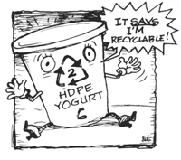 My project is about plastic recycling in Berkeley and Oakland. How did I find the project? 1. This is just something I'm interesed in. 2. I wrote to many supermarkets couple years ago regarding to their plastic bags recycling as a class assignment. I was going to look more into this issue as my senior project... and it just evolved to what I'm doing now. Advice: start early.
My project is about plastic recycling in Berkeley and Oakland. How did I find the project? 1. This is just something I'm interesed in. 2. I wrote to many supermarkets couple years ago regarding to their plastic bags recycling as a class assignment. I was going to look more into this issue as my senior project... and it just evolved to what I'm doing now. Advice: start early.
Pauling Sun, October 2003
I took ESPM 166 last semester (Spring 2003). In that class, we had quite number of guest speakers, and one of guest speakers was the head of NGO in Nigeria. I was impressed with his talk, so after class I sent him e-mail to ask if I can do something in Nigeria during summer. And I was accepted.
Michiko Ishisone, October 2003
I took a lot of classes that had to do with the ideas of nature and culture, and how they are intertwined and cannot be seperated. When considering nature, one must also consider culture, and vice versa. My thesis topic came from the ideas and tools I learned in these classes. Going to office hours in classes you like just to talk about the ideas in the class with the professors (and not get questions answered) really helps too. Professors love to talk about the classes they teach in other forms than just "what did you mean when you said such and such in class last week?" Talking to professors helped me mold my thesis topic into something I find very interesting and intruiging.
Ryan worked with Professor Louise Fortmann, Professor and Division Chair, Division of Society & Environment
Ryan Southwick, October 2003
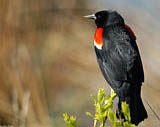 I've spent years birdwatching in local parks on weekends, and I found a way to turn this activity, which I would be out doing anyway, into a project. From my observations over time, I've noticed trends and differences, now I take data and quantify those changes. Something I love and something I know.
I've spent years birdwatching in local parks on weekends, and I found a way to turn this activity, which I would be out doing anyway, into a project. From my observations over time, I've noticed trends and differences, now I take data and quantify those changes. Something I love and something I know.
Sara Taylor, October 2003
I took a class my first year at Berkeley and really liked the professor who taught it. I approached him asking if he needed anyone in the lab and he later offered me a job. Taking a smaller specific class in a field you are interested is a great way to meet and get to know professors. It also makes it easier to ask to work in someone's lab because they already have an idea who you are.
Theresa Hendrick, October 2003
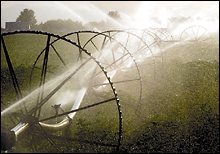 My interest in alfalfa stemmed from my background in the agricultural sciences. Since I had relatives in the Imperial Valley, whos local economy is dependent on agriculture, it made it easier to conduct my experiment, which would take a time frame of at least 2 months (i.e. growing the alfalfa). The ongoing water rights dispute between the Imperial Irrigation District and the San Diego County Water Authority also fueled my interest in the experiment.
My interest in alfalfa stemmed from my background in the agricultural sciences. Since I had relatives in the Imperial Valley, whos local economy is dependent on agriculture, it made it easier to conduct my experiment, which would take a time frame of at least 2 months (i.e. growing the alfalfa). The ongoing water rights dispute between the Imperial Irrigation District and the San Diego County Water Authority also fueled my interest in the experiment.
Carlos Mendoza, October 2003
All I knew was my general interest: Public Health. However, I found it
extremely difficult to design a practical project, given my limited resources in the field. I heard Justin Remais give a brief talk about his ongoing grad research in PH, and I took him up on his invitation to work with him. I'd also recommend talking with Dr. Pasty Wakimoto in the School of PH. She has incredibly helpful advice for undergrads interested in PH research, and also for seniors looking to apply to UCB's SPH grad program. Those of you leaning towards a PH project: don't be discouraged! I know it's a bit daunting, and for some, a bit out of your comfort zone (as it was for me). But be proactive! Opportunity is definetely out there, so talk with GSIs, read prof profiles, knock on professors' doors. The earlier, the better. Don't panic, though. Be confidant in what you do - or don't - know, and stick true to your interests.
Rilene Chew, October 2003
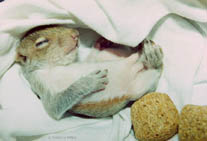 I've been interested in environmental education for awhile now, so I knew I wanted to do my project on something relating to that. In the past, I've worked at a wildlife rehabilitation facility that I knew would be willing to help me with a project. By combining my interests in environmental education and wildlife I came up with an idea for my project. My advice is to think about what you're interested in and use that to develop a project.
I've been interested in environmental education for awhile now, so I knew I wanted to do my project on something relating to that. In the past, I've worked at a wildlife rehabilitation facility that I knew would be willing to help me with a project. By combining my interests in environmental education and wildlife I came up with an idea for my project. My advice is to think about what you're interested in and use that to develop a project.
Jennifer Taylor, October 2003
I found my project by talking to a professor whose class I was taking. I thought his course was interesting, so I went to his website and read about the research his lab was currently doing. After getting to know him and having talked to him a few times about non-thesis related stuff, I went to his office hours, told him I had a thesis to do, told him I was interested in his work, and asked if he would mentor me. He said sure. And that's the story of how I found my project.
Evan Lue, November 2004
I found my project through the es 196 website.
Nancy Vuong, November 2004
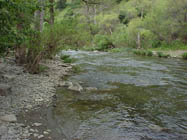 I became interested in creeks and creek restoration after taking a class that studied Strawberry Creek from its headwaters to its mouth. I grew up near the Alameda Creek and spent many afternoons playng in and
collecting tadpoles from this creek as a child. So basically I'm performing a study on the Alameda Creek since it combined my scientific interests with something familiar.
I became interested in creeks and creek restoration after taking a class that studied Strawberry Creek from its headwaters to its mouth. I grew up near the Alameda Creek and spent many afternoons playng in and
collecting tadpoles from this creek as a child. So basically I'm performing a study on the Alameda Creek since it combined my scientific interests with something familiar.
Adnan Iqbal, October 2003
I had been trying to settle on a project idea for my senior thesis practically all summer while working in an OBGYN's office. It was literally through a bunch of scattered conversations with doctors and a series of personal observations of patients that I began asking a few of my own questions. It seems now that JUST asking questions has allowed me to find out for myself where my interest lies.
Bhumi Bhutani, October 2003
I found my topic (perceptions of climate change in communities of color) and mentor through an internship I did my junior year at Redefining Progress. If you are interested in the more social science side of ES, then I suggest researching some local non-profit organizations, finding one you like, and doing an internship there. That way you can get experience in a field and also see if you're interested in it enough to pursue a senior thesis related to it.
Emily Lee, October 2003
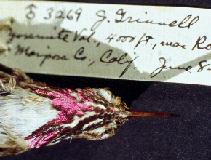 I have always been interested in patterns over time. Of particular interest has been the dire warnings of how the blue whale, the white rhino, etc. will be extinct by two or three years ago, Of how filthy the air of Los Angeles is when really everyone means how polluted it was. It is clear that the environmental moment has had an effect. I wanted to examine that. But to watch changes over time, one needs a baseline -- data from the past. And then I became really curious about our past and what it has to say. And all those lovely books in the MVZ were begging to be read... If I were to give advice, I would say "know what interests you and pursue its possibilities. That which seems purely fanciful can be simplified to fit with the realm of the possible."
I have always been interested in patterns over time. Of particular interest has been the dire warnings of how the blue whale, the white rhino, etc. will be extinct by two or three years ago, Of how filthy the air of Los Angeles is when really everyone means how polluted it was. It is clear that the environmental moment has had an effect. I wanted to examine that. But to watch changes over time, one needs a baseline -- data from the past. And then I became really curious about our past and what it has to say. And all those lovely books in the MVZ were begging to be read... If I were to give advice, I would say "know what interests you and pursue its possibilities. That which seems purely fanciful can be simplified to fit with the realm of the possible."
Elizabeth Eklund, October 2003
It took me a long time to find my project. I actually began on a
different one before abandoning it to do something completely different. I did this because, although it was interesting, I didn't feel my first project adequately represented my interests in environmental science. To find my current project I re-examined my interests and attempted to map them onto a relevant field in environmental science; then I simply used the resources available to me to narrow it down. I ended up pushing the envelope with a project in first world political ecology.
Todd Jones, October 2003
 My advice would be to keep your eyes open for opportunities. In ES 100, our class had a speaker from the USGS and he was talking about the same sort of thing i was interested in. So i talked to him after class and then followed up with emails over the summer to express my interest in doing my project in a related area. He's been a great help since then.
My advice would be to keep your eyes open for opportunities. In ES 100, our class had a speaker from the USGS and he was talking about the same sort of thing i was interested in. So i talked to him after class and then followed up with emails over the summer to express my interest in doing my project in a related area. He's been a great help since then.
Janny Choy, October 2003
I found my project thjrough a class I took last spring semester, Geography 180- Field Studies in Physical Geography. I was able to participate in a project that has now become part of my project. The class put me in contact with another professor in the geography department. Don't forget about the geography department! There are many opportunities for projects.
Jordan Malin, November 20043
There are so many possible projects for ES 196. I found intriguing topics from my classes, talking to professors, an internship I had, searching through professor's websites, and reading the news. The topic I finally chose was one of many that I could have done. The aspects that led me choose it were: 1. The project was my own creation, not a side topic that would partially contribute to a project that a professor or grad student was already doing, 2. I could see myself doing it; the methods appealed to me, and 3. It was different from what any one else in ES 196 was doing or had ever done. If you are like me and you find everything related to science and the environment really interesting, ask yourself How you want your project to be instead of What you want your project to be.
Haley Jones, November 2004
![]() I was taking Energy and Resources 102 last semester, taught by John Harte, and there was a problem we discussed in class about urban heat islands. I was interested in how cities influence the climate, and I thought the term "urban heat island" just sounded nice. I looked for resources on campus, and didn't really find any until I went to LBL to talk to a scientist who specializes in the field. He was more than happy for me to help him out, and I was happy since I found a project fairly easily.
I was taking Energy and Resources 102 last semester, taught by John Harte, and there was a problem we discussed in class about urban heat islands. I was interested in how cities influence the climate, and I thought the term "urban heat island" just sounded nice. I looked for resources on campus, and didn't really find any until I went to LBL to talk to a scientist who specializes in the field. He was more than happy for me to help him out, and I was happy since I found a project fairly easily.
Josh Pollak, November 2004
 I had an aspect of it that interested me the most, then used that theme to develop my own, new question regarding the effects of theve been involved in recycling in some way or another since high school. I had worked with Lisa Bauer from Cal Recycling and Dave Williamson from the Ecology Center, so I asked them if they had any ideas for a project that would be interesting and useful. Dave suggested updating the Ecology Center's Plastics Task Force Report, however that was not quite the "research project" form desired by this course and the scope would have been too large to accomplish in a school year. I read the report and picked the a plastic industry's appropriation of the "chasing arrows" logo on consumer perceptions.
I had an aspect of it that interested me the most, then used that theme to develop my own, new question regarding the effects of theve been involved in recycling in some way or another since high school. I had worked with Lisa Bauer from Cal Recycling and Dave Williamson from the Ecology Center, so I asked them if they had any ideas for a project that would be interesting and useful. Dave suggested updating the Ecology Center's Plastics Task Force Report, however that was not quite the "research project" form desired by this course and the scope would have been too large to accomplish in a school year. I read the report and picked the a plastic industry's appropriation of the "chasing arrows" logo on consumer perceptions.
David Siddiqui, November 2004
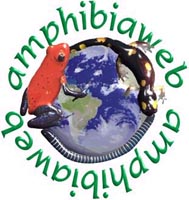 I worked through urap doing amphibiaweb and met dave wake, vance and tate. i worked on the project for a year and started to inquire about other projects i may be able to work on for my thesis and vance threw out options to me. i played around with some ideas and then settled on the analysis of parasite loads in the gut of rana muscosa because it was something that interested me and i had a background in. doing urap for an extended period of time let me establish a connection with people in the mvz and it helped lead to my project.
I worked through urap doing amphibiaweb and met dave wake, vance and tate. i worked on the project for a year and started to inquire about other projects i may be able to work on for my thesis and vance threw out options to me. i played around with some ideas and then settled on the analysis of parasite loads in the gut of rana muscosa because it was something that interested me and i had a background in. doing urap for an extended period of time let me establish a connection with people in the mvz and it helped lead to my project.
Kevin J. Gin, November 2004
I visited one of my professors in office hours and asked if he knew of any professors collecting research in a topic related to what I am interested in. He gave me the contact information of one of the graduate students from his lab. She and I worked together to develop a project I could do, and then she loaned me all the equipment I'd need to collect the data.
Sara Lopus, November 2004
